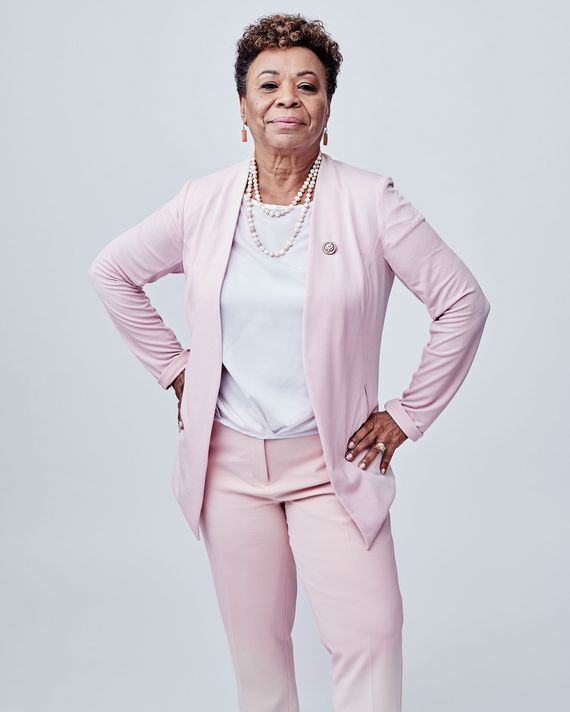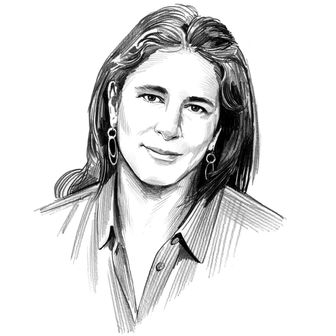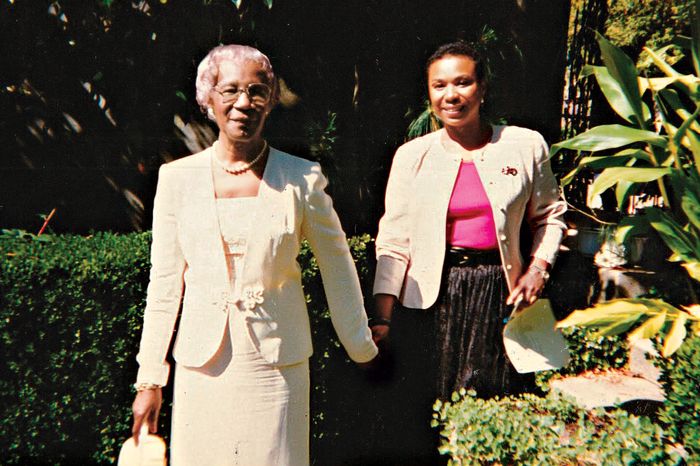
Representative Barbara Lee of California had spent the morning on the floor of the U.S. House of Representatives, giving a speech — word for word — that she’d given 17 years ago. “Let’s just pause … and think through the implications of our actions today, so that this does not spiral out of control.”
She’d first uttered those words on the House floor back in September 2001, when she opposed the Authorization for Use of Military Force, which granted President George W. Bush — and every president who’s come after him — the authority to go to war without congressional approval. Lee was just three years into her role representing her Oakland district when she became the only member of Congress to oppose its passage.
As she sat at a table in the Rayburn room of the House a few hours after having revisited her 17-year-old oratory, Lee recalled how she’d felt back then. “It was kind of lonely, but it’s okay. Being a black woman in America, you stand out. You have to just stand your ground with what you believe in. The majority of black women do that in their daily lives all the time.”
Lee, 72, is polite and laughs often, almost shyly; she holds the eye of whomever she’s speaking to, making sure she’s being understood clearly. She is also unfailingly optimistic. As a teen in California, Lee longed to be a cheerleader, but no black girls had ever been chosen for her high school’s squad. So she approached the NAACP, which helped her integrate the team. Lee displays a photograph of herself as a cheerleader in her House office.
The congresswoman’s singularity — her willingness to be the one dissenting voice among 435 — felt extraordinary to me in 2001. It was extraordinary, but perhaps more so has been Lee’s determination in the intervening years to work to repeal the act, which has been used to justify at least 37 U.S. military operations.
In the summer of 2017, she persuaded enough of her colleagues, both Democrat and Republican, to support her effort that her repeal passed out of committee, a moment of bipartisan cooperation that earned applause from her colleagues in the chamber. But days later, House Speaker Paul Ryan stripped the repeal, in the middle of the night, from the bill to which it had been appended. And so Lee is still out there making her case. “I’m gonna walk around with my piece of paper and say, ‘Will you sign this?’ ” until she gets the votes she needs.
That’s not the only way she’s going to be pressing her party for support in the coming weeks. Lee is running for chair of the House Democratic Caucus, the party’s No. 5 leadership role, held most recently by Joe Crowley. After Crowley was beaten soundly by Alexandria Ocasio-Cortez in the primary this summer, Lee announced that she’d be seeking his post, running against fellow Californian Linda Sánchez. No woman has ever held the spot, and no black woman has ever been elected to the leadership in either the Democratic or Republican parties. Two days after the midterms, Hakeem Jeffries announced he was entering the race and Sánchez dropped out after her husband was indicted on federal charges.
The chair’s role is to facilitate communication and functionality within the party caucus. “I see it as being a convener,” said Lee. A former chair of the Congressional Black Caucus and co-chair of the Progressive Caucus, Lee may be particularly well equipped to help a new class of House members — a historic number of them progressive women, many women of color — navigate an institution that was not built with them in mind.
In 1972, Barbara Lee was a single mother of two, on welfare, attending Mills College in California. She was doing work with the Black Panther Party and held firm to the belief that political and social change would not come from inside electoral politics. She was not registered to vote.
And then New York congresswoman and presidential candidate Shirley Chisholm came to speak at Mills. Chisholm gave parts of her speech in fluent Spanish; she talked about subsidized day care and wage inequality and welfare. An enraptured Lee approached Chisholm afterward, offering to work on her campaign. Chisholm chided her for not being registered to vote and told her if she would do so, she could help run her California campaign. Lee wound up a Chisholm delegate at the 1972 Democratic convention. The experience hooked her on politics, and she went on to work for California congressman Ron Dellums. She served as a California state legislator before winning Dellums’s old seat after his retirement from Congress, and she’s been there ever since. After announcing her bid for chair, Lee was reminded that Chisholm had once run for the same job; she’d earned 96 votes and lost, and the party had created a new position for her: secretary. Lee recalled that Chisholm initially intended to refuse but decided to take the job anyway because it would put her “in the room.”
It’s an impulse that also guides Lee, who is aware of her singularity, not just in terms of the votes she’s cast but as far as “my background, who I am, my perspective, who I represent. When I’m in the room and nobody else that looks like me is in the room, it makes a big difference.” That’s not just political poetry. “I’ve been working since I’ve been here to try to get the Democratic caucus to focus on poverty and low-income working families. We’ve always talked about the middle class, but we don’t quite get to low-income people.” Several years ago, she got leadership to agree to a Task Force on Poverty, Income Inequality and Opportunity.
And in 2015, she introduced the EACH Woman Act, a bill that would overturn the Hyde Amendment, a legislative rider in place since 1976 that forbids the use of federal money to pay for abortions, effectively making abortion inaccessible to poor women, and especially to poor women of color, exacerbating gender, race, and class inequalities.
“I had to wait, because around here even talking about Hyde was a no-no,” said Lee of her long-brewing plans to challenge the law. But as Republicans got more serious about going after Planned Parenthood, Lee felt “they’d gone off the scale.” She looked to the grassroots for backup. “Up until then, the pro-choice movement was mostly white, middle-income women. I used to talk to Gloria Steinem about trying to figure out ways to broaden the base. I said, ‘Hyde will do it.’ So these young women went around the country, and they organized.”
With progressive activists behind her, Lee took the question to House leadership. The reaction, as she described it, was “Ehhh. But okay.” She pushed for more: “ ‘Women need to see we’re on the offense.’ I had to really convince ’em. And I did.” Though party leaders assumed the bill would be supported mostly just by Lee and Jan Schakowsky of Illinois, Lee reports with pride, “We introduced it with 30 members. That shocked the heck out of them.” Three years later, the each Woman Act has the support of 134 representatives and a commitment to repealing Hyde became part of the 2016 Democratic platform, in no small part thanks to Lee’s maneuverings between intransigent party factions. She had avoided endorsing either Hillary Clinton or Bernie Sanders, “for one reason: I wanted to be on the platform-drafting committee.” In other words, in the room. Once she was there, Lee recalled, “97 percent of the time” the Bernie people had her vote, which gave her negotiating leverage with the Clinton people, with whom she was on good terms.
Lee is no purist and believes in the mechanisms of power, leverage, and, sometimes, compromise. She sees a path forward for progressives — not outside the system, as she used to believe, but by making use of it. Even without the Senate, her party’s return to the House majority will enable it, she says, to pursue a “bold legislative agenda.” She wants to reduce health-care and prescription-drug costs, present an infrastructure bill that would create good jobs with high wages, and “retake the role of oversight and investigation” with regard to corruption in the Trump administration.
I asked her what it feels like, as the leftmost member of her party for almost 20 years, having so often stood alone, to watch as that body moves toward her.
She smiled and recalled something that Dellums used to say. “Look, if you know you’re right, if you think this is gonna create more justice and more peace, take your position, stand on that corner, just keep standing on that street corner.’ ”
She paused. Eventually, Dellums promised, “they all are gonna walk to you.”
*This article appears in the November 12, 2018, issue of New York Magazine. Subscribe Now!






